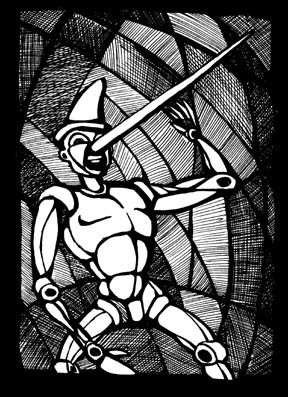
Image from Eliot K. Daughtry's Pinocchio, with this eerily apt caption: Ah truth, it's overrated if you need to clear the way in front of you. Apparently.
I've often jokingly referred to fiction writers as professional liars, but that appellation only fits if we're selling the shinola as truth. What's bothering me lately is the distortion of truth followed by the offhanded defense of these compromised facts as entertainment and disavowal of creative imagination.
There's a lot of online talk about it: Whether it's the biographical massaging and historical inaccuracies as dramatic improvements in Neverland, Steven Spielberg's Munich, or Good Night and Good Luck, how much is too much? Is it appropriate to willingly mishape a narrative about real people and events into a chronological and factual falsehood?
Many argue that movies and television must simplify complexity into clear dramatic moments even if they never existed. But can't a better, more careful writer meet the challenge of finding the dramatic moment within the truth without adding the car chase, extra children, or perverting the time-space continuum? Next, it's proposed that to make a point by ignoring opposing information is the art of debate and expected in any work with an obvious viewpoint. But I still don't like that everyone seems so complacent about it, as if there weren't any difference in a marriage to a wife 25 years younger and one 8 years older. As if calling something a "reality" show while hiding the writers behind credits that sever them from their contributions and disguise the carefulness with which such reality is orchestrated is fair play. It isn't. When people make up outrageous stories to get onto daytime talk shows, stories never corroborated and instead enhanced by show staff, we're supposed to assume that people know it couldn't possibly be real. Do they? Or is everyone more shamelessly letting their dirty laundry and muffin tops waggle in the breeze, since even truly skanky solipsists gain moral position in comparison to these fictionally-enhanced worst cases?
It's not just movies and TV consciously lying though, and not just for dramatic affect. There are rafts of plagiarized work in academia. Reportage has its share of notably bad actors like Jayson Blair, Judith Miller who operated without editorial backup, and Stephen Glass who was later rewarded by a published novel to rationalize his perfidy.
And what about the South Korean cloning king who lied about his data and results, selling irrational hopes for healing to the desperately ill while sticking a finger in the eye of people who've been asking for the FDA to relax its focus on litigation to speed potential cures to the very sick?
Well, here are two more disgusting new wrinkles in the realm of fiction. Lying fiction an oxymoron? Not at all. You'll see.
Publisher's Marketplace just announced a new two-book deal, including a first novel, for James Frey who hit bestseller lists and Oprah's Book Club with his memoir A Million Little Pieces. Only it isn't a memoir. The Smoking Gun effectively asserts that AMLP IS Frey's first novel, because it turns out he's lied like crazy to make his true life more harrowing and saleable.
And 3-book fiction wonder JT Leroy, who undoubtedly gained traction as a social critic with his history of homelessness and addiction and child prostitution, not to mention his AIDS, turns out to be (in public appearances) the sister of the one of the San Francisco couple who claimed to have lovingly "rescued" the lad. Unresolved is who wrote the books, but JTL is gender-confused vaporware designed by wannabees and star-effers.
I wish I were more confident that this kind of embarassment would reduce the importance to agents and publishers of the bio as ultimate wedge to selling fiction. It shouldn't matter who you are as much as what and how it's been told, but then I've never forgiven lousy writing just because it's supposedly a true story, even a compelling one. Iyanla Vanzant, I'm talking to you.
I'm going to do something radical. If I want to make a point or a scene, I'll fabricate the scenario within a world you can understand without documentation or defamation. Why malform the truth of places and people when I can unapologetically create whatever circumstances I require? I'm going to tell stories, not mislabeled tall tales. I'm not going to pretend it's all real to make it gasp-worthy or approachable. If I can't write it so people are interested and can relate, that's my fault, one that can only be compounded, not cured by mounting deceit.

No comments:
Post a Comment